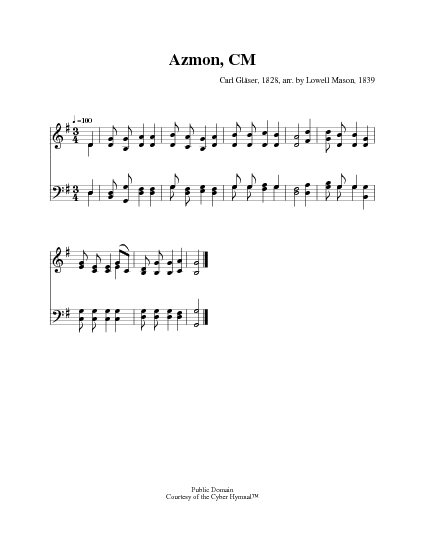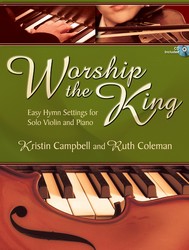- |
User Links
O Savior, Whom This Holy Morn

O Savior, Whom that holy morn
Author: Reginald Heber (1811)Published in 13 hymnals
Printable scores: PDF, MusicXMLAudio files: MIDI
Representative Text
1. O Savior, whom this holy morn
Gave to our world below;
To mortal want and labor born,
And more than mortal woe.
2. Incarnate Word! by every grief,
By each temptation tried,
Who lived to yield our ills relief,
And to redeem us died!
3. If gaily clothed and proudly fed
In dangerous wealth we dwell,
Remind us of Thy manger bed
And lowly cottage cell.
4. If pressed by poverty severe
In anxious want we pine,
O may Thy Spirit whisper near
How poor a lot was Thine!
5. Through this life’s ever varying scene
From sin preserve us free;
Like us Thou hast a mourner been,
May we rejoice with Thee!
Author: Reginald Heber
 Reginald Heber was born in 1783 into a wealthy, educated family. He was a bright youth, translating a Latin classic into English verse by the time he was seven, entering Oxford at 17, and winning two awards for his poetry during his time there. After his graduation he became rector of his father's church in the village of Hodnet near Shrewsbury in the west of England where he remained for 16 years. He was appointed Bishop of Calcutta in 1823 and worked tirelessly for three years until the weather and travel took its toll on his health and he died of a stroke. Most of his 57 hymns, which include "Holy, Holy, Holy," are still in use today.
-- Greg Scheer, 1995… Go to person page >
Reginald Heber was born in 1783 into a wealthy, educated family. He was a bright youth, translating a Latin classic into English verse by the time he was seven, entering Oxford at 17, and winning two awards for his poetry during his time there. After his graduation he became rector of his father's church in the village of Hodnet near Shrewsbury in the west of England where he remained for 16 years. He was appointed Bishop of Calcutta in 1823 and worked tirelessly for three years until the weather and travel took its toll on his health and he died of a stroke. Most of his 57 hymns, which include "Holy, Holy, Holy," are still in use today.
-- Greg Scheer, 1995… Go to person page >Text Information
| First Line: | O Savior, Whom that holy morn |
| Title: | O Savior, Whom This Holy Morn |
| Author: | Reginald Heber (1811) |
| Meter: | 8.6.8.6 |
| Source: | Christian Observer, November 1811 |
| Language: | English |
| Notes: | This hymn has appeared in many altered forms. |
| Copyright: | Public Domain |
Notes
O Saviour, Whom this holy morn. Bishop R. Heber. [Christmas.] Published in the Christian Observer, Nov., 1811 (p. 697), in 5 stanzas of 4 lines and headed, "Christmas Day." The opening stanza reads:—
”Oh Saviour! Whom this holy morn
Gave to our world below;
To wandering and to labour born,
To weakness and to woe!"
In Heber's posthumous Hymns, &c, 1827, p. 13, it was given with alterations, the first stanza reading:—
"Oh Saviour, Whom this holy morn
Gave to our world below;
To mortal want and labour born,
And more than mortal woe!"
Each stanza, except stanza ii., is altered in like manner, the result being two distinct texts. Of these texts that of 1827 is almost absolutely followed by hymn book compilers. Very few, however, give it in its complete form. The Hymnal Companion is an exception in favour of the full 1827 text, with the change of stanza v. l. i., "Through fickle fortune's various scene," to" Through this world's fickle various scene." Other forms of the hymn are:—
1. 0 Saviour, Whom this joyful morn. This text is very much altered throughout. The opening stanza is the 1811 text with alterations; the rest are altered from the text of 1827. In this form it was given in Bickersteth's Christian Psalmody, 1833, No. 301; Elliott's Psalms & Hymns, 1835 ; and again in recent hymn books.
2. O God, Whose Holy Child this morn. This altered form of the 1827 text appeared in Martineau's Hymns, 1840.
3. Incarnate Word! by every grief. This, beginning with stanza ii. of the 1827 text, is No. 318 in the American Baptist Praise Book, N. Y., 1871.
4. Jesus, Thou man of Sorrows born. This is found in several modern collections, including Common Praise, 1879, and others, and is the 1811 text slightly altered.
When these various forms of the text are taken into account it is found that the use of this hymn is extensive. It is, however, far from being one of Heber's best productions.
--John Julian, Dictionary of Hymnology (1907)
Tune
AZMONLowell Mason (PHH 96) adapted AZMON from a melody composed by Carl G. Gläser in 1828. Mason published a duple-meter version in his Modern Psalmist (1839) but changed it to triple meter in his later publications. Mason used (often obscure) biblical names for his tune titles; Azmon, a city south of C…
BURFORD (Purcell)


 My Starred Hymns
My Starred Hymns







